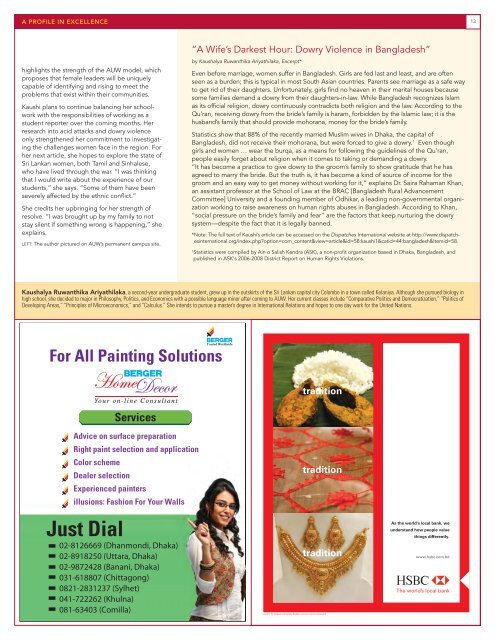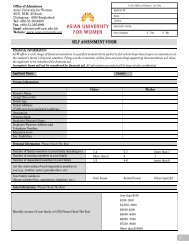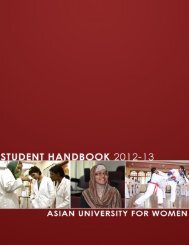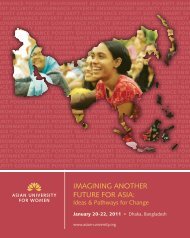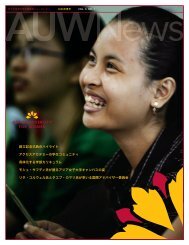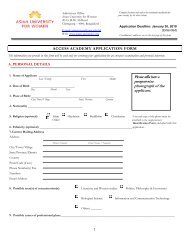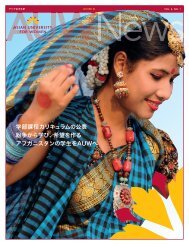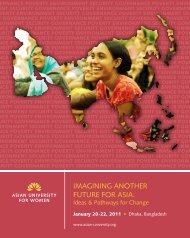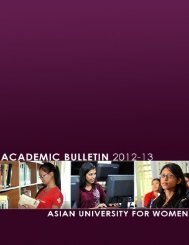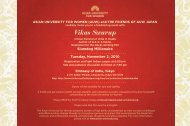Fall 2010 - Asian University for Women
Fall 2010 - Asian University for Women
Fall 2010 - Asian University for Women
Create successful ePaper yourself
Turn your PDF publications into a flip-book with our unique Google optimized e-Paper software.
A PROFILE IN EXCELLENCE<br />
13<br />
highlights the strength of the AUW model, which<br />
proposes that female leaders will be uniquely<br />
capable of identifying and rising to meet the<br />
problems that exist within their communities.<br />
Kaushi plans to continue balancing her schoolwork<br />
with the responsibilities of working as a<br />
student reporter over the coming months. Her<br />
research into acid attacks and dowry violence<br />
only strengthened her commitment to investigating<br />
the challenges women face in the region. For<br />
her next article, she hopes to explore the state of<br />
Sri Lankan women, both Tamil and Sinhalese,<br />
who have lived through the war. “I was thinking<br />
that I would write about the experience of our<br />
students,” she says. “Some of them have been<br />
severely affected by the ethnic conflict.”<br />
She credits her upbringing <strong>for</strong> her strength of<br />
resolve. “I was brought up by my family to not<br />
stay silent if something wrong is happening,” she<br />
explains.<br />
LEFT: The author pictured on AUW’s permanent campus site.<br />
“A Wife’s Darkest Hour: Dowry Violence in Bangladesh”<br />
by Kaushalya Ruwanthika Ariyathilaka, Excerpt*<br />
Even be<strong>for</strong>e marriage, women suffer in Bangladesh. Girls are fed last and least, and are often<br />
seen as a burden; this is typical in most South <strong>Asian</strong> countries. Parents see marriage as a safe way<br />
to get rid of their daughters. Un<strong>for</strong>tunately, girls find no heaven in their marital houses because<br />
some families demand a dowry from their daughters-in-law. While Bangladesh recognizes Islam<br />
as its official religion, dowry continuously contradicts both religion and the law. According to the<br />
Qu’ran, receiving dowry from the bride’s family is haram, <strong>for</strong>bidden by the Islamic law; it is the<br />
husband’s family that should provide mohorana, money <strong>for</strong> the bride’s family.<br />
Statistics show that 88% of the recently married Muslim wives in Dhaka, the capital of<br />
Bangladesh, did not receive their mohorana, but were <strong>for</strong>ced to give a dowry. 1 Even though<br />
girls and women … wear the burqa, as a means <strong>for</strong> following the guidelines of the Qu’ran,<br />
people easily <strong>for</strong>get about religion when it comes to taking or demanding a dowry.<br />
“It has become a practice to give dowry to the groom’s family to show gratitude that he has<br />
agreed to marry the bride. But the truth is, it has become a kind of source of income <strong>for</strong> the<br />
groom and an easy way to get money without working <strong>for</strong> it,” explains Dr. Saira Rahaman Khan,<br />
an assistant professor at the School of Law at the BRAC [Bangladesh Rural Advancement<br />
Committee] <strong>University</strong> and a founding member of Odhikar, a leading non-governmental organization<br />
working to raise awareness on human rights abuses in Bangladesh. According to Khan,<br />
“social pressure on the bride’s family and fear” are the factors that keep nurturing the dowry<br />
system—despite the fact that it is legally banned.<br />
*Note: The full text of Kaushi’s article can be accessed on the Dispatches International website at http://www.dispatchesinternational.org/index.php?option=com_content&view=article&id=58:kaushi1&catid=44:bangladesh&Itemid=58.<br />
1<br />
Statistics were compiled by Ain o Salish Kendra (ASK), a non-profit organization based in Dhaka, Bangladesh, and<br />
published in ASK's 2006-2008 District Report on Human Rights Violations.<br />
Kaushalya Ruwanthika Ariyathilaka, a second-year undergraduate student, grew up in the outskirts of the Sri Lankan capital city Colombo in a town called Kelaniya. Although she pursued biology in<br />
high school, she decided to major in Philosophy, Politics, and Economics with a possible language minor after coming to AUW. Her current classes include “Comparative Politics and Democratization,” “Politics of<br />
Developing Areas,” “Principles of Microeconomics,” and “Calculus.” She intends to pursue a master’s degree in International Relations and hopes to one day work <strong>for</strong> the United Nations.<br />
For All Painting Solutions<br />
Advice on surface preparation<br />
Right paint selection and application<br />
Color scheme<br />
Dealer selection<br />
Services<br />
Experienced painters<br />
illusions: Fashion For Your Walls<br />
Just Dial<br />
02-8126669 (Dhanmondi, Dhaka)<br />
02-8918250 (Uttara, Dhaka)<br />
02-9872428 (Banani, Dhaka)<br />
031-618807 (Chittagong)<br />
0821-2831237 (Sylhet)<br />
041-722262 (Khulna)<br />
081-63403 (Comilla)


